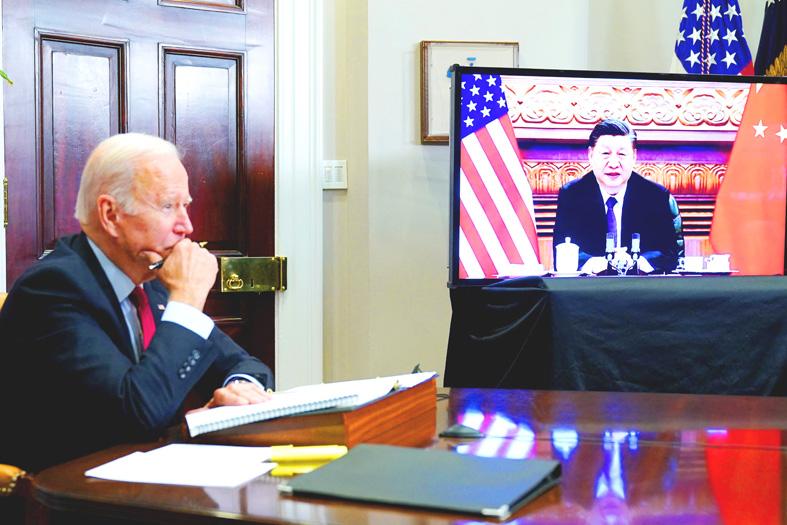US President Joe Biden on Thursday signed into law legislation that bans imports from China’s Xinjiang region over concerns about forced labor, the White House said, provoking an angry Chinese condemnation.
The Uyghur Forced Labor Prevention Act is part of the US pushback against Beijing’s treatment of the Xinjiang’s Uighur Muslim minority, which Washington has labeled genocide.
The bill passed the US Congress earlier this month after lawmakers reached a compromise between House of Representatives and Senate versions.

Photo: AFP
Key to the legislation is a “rebuttable presumption” that assumes all goods from Xinjiang, where Beijing has established detention camps for Uighurs and other Muslims, are made with forced labor. It bars imports unless it can be proven otherwise.
Some goods — such as cotton, tomatoes and polysilicon used to manufacture solar panels — are designated “high priority” for enforcement action.
China denies abuses in Xinjiang, a major cotton producer that also supplies much of the world’s materials for solar panels.
The Chinese embassy in Washington said that the act “ignores the truth and maliciously slanders the human rights situation in Xinjiang.”
“This is a severe violation of international law and norms of international relations, and a gross interference in China’s internal affairs. China strongly condemns and firmly rejects it,” embassy spokesperson Liu Pengyu (劉鵬宇) said in an e-mailed statement.
He said China “would respond further in light of the development of the situation,” but did not elaborate.
US Commission on International Religious Freedom Uighur-American vice chair Nury Turkel told Reuters earlier this month that the act’s effectiveness would depend on the willingness of Biden’s administration to ensure it is complied with, especially when companies seek waivers.
US Secretary of State Antony Blinken said Biden’s approval of the law underscored the “United States’ commitment to combating forced labor, including in the context of the ongoing genocide in Xinjiang.”
“The state department is committed to working with Congress and our interagency partners to continue addressing forced labor in Xinjiang and to strengthen international action against this egregious violation of human rights,” he said.
One of the bill’s coauthors, US Senator Jeff Merkley, said it was necessary to “send a resounding and unequivocal message against genocide and slave labor.”
“Now ... we can finally ensure that American consumers and businesses can buy goods without inadvertent complicity in China’s horrific human rights abuses,” Merkley said in a statement.
In its final days in January, the administration of former US president Donald Trump announced a ban on all Xinjiang cotton and tomato products.
The US Customs and Border Protection agency estimated then that about US$9 billion of cotton products and US$10 million of tomato products were imported from China during the previous year.

Real estate agent and property developer JSL Construction & Development Co (愛山林) led the average compensation rankings among companies listed on the Taiwan Stock Exchange (TWSE) last year, while contract chipmaker Taiwan Semiconductor Manufacturing Co (TSMC, 台積電) finished 14th. JSL Construction paid its employees total average compensation of NT$4.78 million (US$159,701), down 13.5 percent from a year earlier, but still ahead of the most profitable listed tech giants, including TSMC, TWSE data showed. Last year, the average compensation (which includes salary, overtime, bonuses and allowances) paid by TSMC rose 21.6 percent to reach about NT$3.33 million, lifting its ranking by 10 notches

Popular vape brands such as Geek Bar might get more expensive in the US — if you can find them at all. Shipments of vapes from China to the US ground to a near halt last month from a year ago, official data showed, hit by US President Donald Trump’s tariffs and a crackdown on unauthorized e-cigarettes in the world’s biggest market for smoking alternatives. That includes Geek Bar, a brand of flavored vapes that is not authorized to sell in the US, but which had been widely available due to porous import controls. One retailer, who asked not to be named, because

SEASONAL WEAKNESS: The combined revenue of the top 10 foundries fell 5.4%, but rush orders and China’s subsidies partially offset slowing demand Taiwan Semiconductor Manufacturing Co (TSMC, 台積電) further solidified its dominance in the global wafer foundry business in the first quarter of this year, remaining far ahead of its closest rival, Samsung Electronics Co, TrendForce Corp (集邦科技) said yesterday. TSMC posted US$25.52 billion in sales in the January-to-March period, down 5 percent from the previous quarter, but its market share rose from 67.1 percent the previous quarter to 67.6 percent, TrendForce said in a report. While smartphone-related wafer shipments declined in the first quarter due to seasonal factors, solid demand for artificial intelligence (AI) and high-performance computing (HPC) devices and urgent TV-related orders

MINERAL DIPLOMACY: The Chinese commerce ministry said it approved applications for the export of rare earths in a move that could help ease US-China trade tensions Chinese Vice Premier He Lifeng (何立峰) is today to meet a US delegation for talks in the UK, Beijing announced on Saturday amid a fragile truce in the trade dispute between the two powers. He is to visit the UK from yesterday to Friday at the invitation of the British government, the Chinese Ministry of Foreign Affairs said in a statement. He and US representatives are to cochair the first meeting of the US-China economic and trade consultation mechanism, it said. US President Donald Trump on Friday announced that a new round of trade talks with China would start in London beginning today,